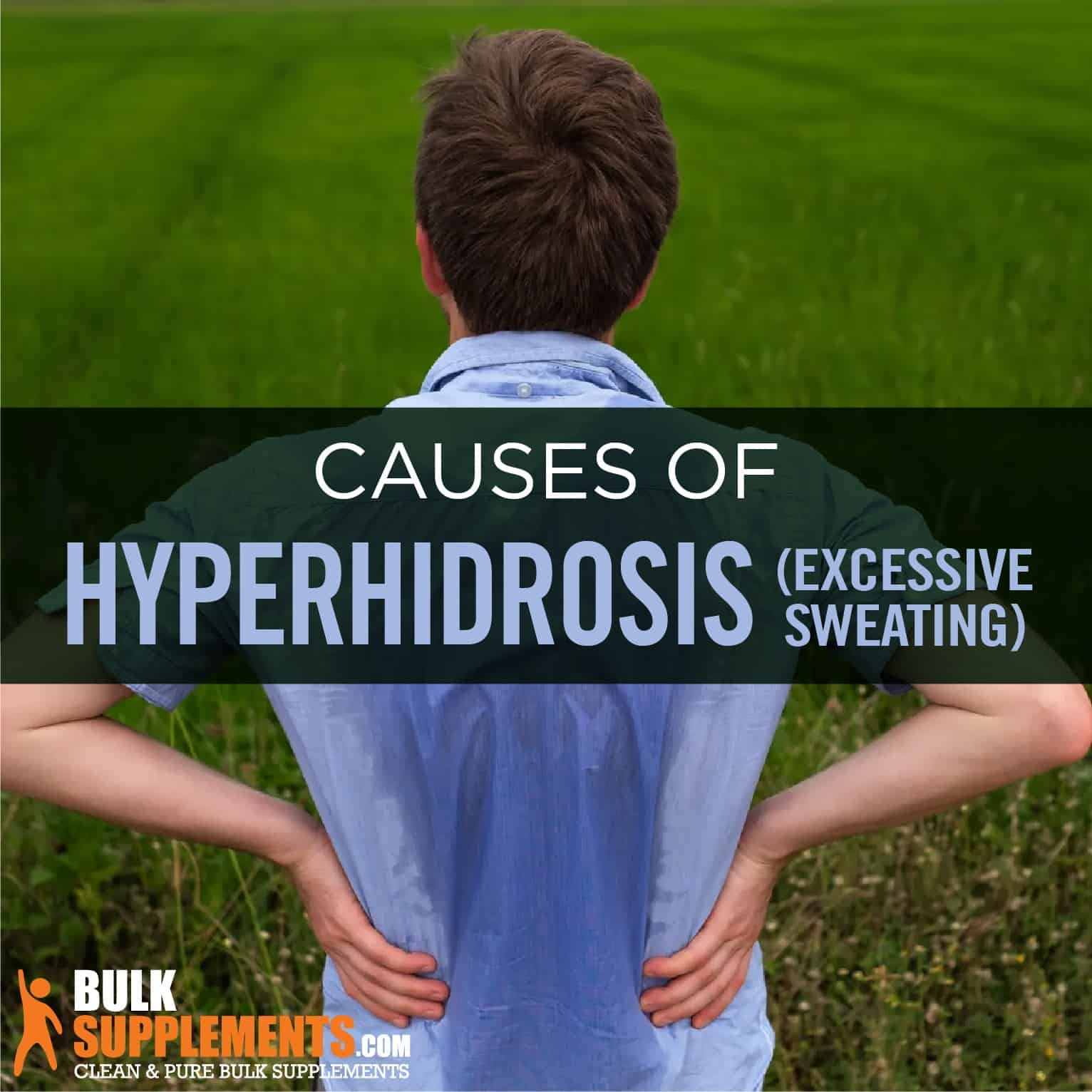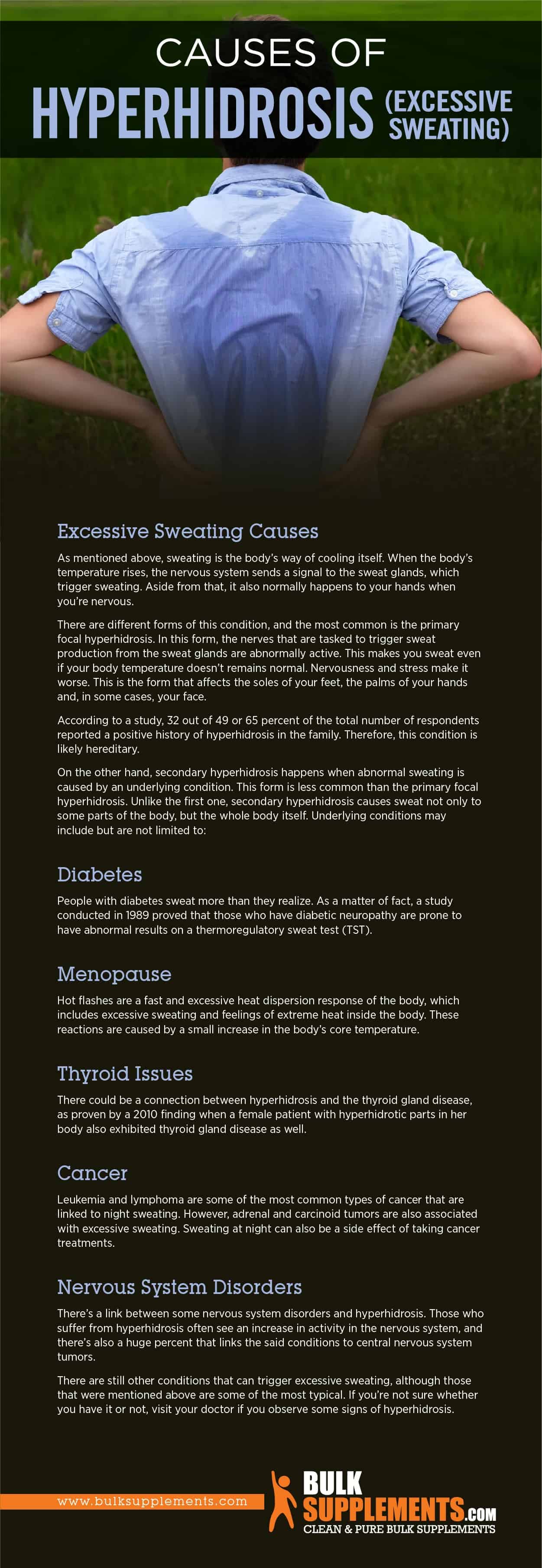Hyperhidrosis (Excessive Sweating): Symptoms, Causes & Treatment
by James Denlinger Digital Marketing Strategist
What is Hyperhidrosis?
As a responsible adult, you’re constantly multitasking and managing a million tasks, right? That’s why sweating is like the blinking of our eyes as far as its natural and uncontrollable nature. Although sweating is inevitable, especially when performing heavy errands and rigorous exercises, do you ever feel like you sweat too much? Do you feel like your shirt is constantly dripping from too much perspiration? Unfortunately, it happens to many, and it is called hyperhidrosis.
Hyperhidrosis is the unusual production of sweat. Studies estimate 2-3 percent of America’s total population suffers from this condition. Excessive sweating at night is perfectly normal, especially when the night is warm. What’s not, however, is when your sweat is dripping from doing nothing. Aside from stifling a person’s daily activities, this condition can also lower someone’s self-confidence and cause embarrassment and social anxiety. Too much sweating can stain light-colored clothes, can keep a person from turning the doorknob or even using one’s phone when hands are wet. In some cases, it can develop skin infections. Although sweating is the body’s way of cooling down, people with hyperhidrosis perspire even when their body temperatures do not warrant cooling.
Types of Hyperhidrosis
There are several types of hyperhidrosis, depending on which body part excretes sweat too much. These are:
- Palmar hyperhidrosis – hyperhidrosis of hands
- Plantar hyperhidrosis – hyperhidrosis of feet
- Axillary hyperhidrosis – hyperhidrosis of the armpits
- Craniofacial hyperhidrosis – excessive sweating from the head to the face
Most of the time, hyperhidrosis treatments are effective in treating the condition. An example of a treatment used by people who suffer from this is an antiperspirant. If antiperspirants don’t help, you may try different options like therapies and medications. In more severe instances, the doctor may suggest that the patient undergoes surgery. This may be done to either get rid of the sweat glands in the area which perspires too much or sever the nerves that cause excessive sweating. During surgery, specialists may find other underlying conditions that cause hyperhidrosis as well.
Excessive Sweating Symptoms
Most of the time, people excrete a lot of sweat when exercising. There are also cases when there’s excessive sweating while sleeping, especially when the night is hot or a person has a bad dream. However, with hyperhidrosis, it exceeds the normal sweating to the point that it’s already dripping from one’s body.
Hyperhidrosis can occur on different parts of the body like the hands, underarms, feet and face; it normally strikes once every week and occurs every time a person wakes up. Also, the abnormal sweating not only affects one body part, but often both sides (the hands or feet, for example).
Here are some of the most common symptoms of hyperhidrosis:
- Sweating unrelated to heat or exercise
- Wet palms despite not washing the hands
- Sweating through clothing
- Sweat dripping off the body
In addition to that, people who have hyperhidrosis may experience:
- Worrying about staining the clothes they wear
- Developing infections brought by bacteria and fungi
- Painful and irritating skin issues
- Being self-conscious
- Social anxiety, which may lead to depression
- Worry about body odor and people noticing it
Although symptoms may differ from one person to another, the ones mentioned above are the most common. If a person experiences more severe symptoms, it’s imperative to get checked by a medical specialist.
Excessive Sweating Causes
As mentioned above, sweating is the body’s way of cooling itself. When the body’s temperature rises, the nervous system sends a signal to the sweat glands, which trigger sweating. Aside from that, it also normally happens to your hands when you’re nervous.
There are different forms of this condition, and the most common is the primary focal hyperhidrosis. In this form, the nerves that are tasked to trigger sweat production from the sweat glands are abnormally active. This makes you sweat even if your body temperature remains normal. Nervousness and stress make it worse. This is the form that affects the soles of your feet, the palms of your hands and, in some cases, your face.
According to a study, 32 out of 49 or 65 percent of the total number of respondents reported a positive history of hyperhidrosis in the family. Therefore, this condition is likely hereditary.
On the other hand, secondary hyperhidrosis happens when abnormal sweating is caused by an underlying condition. This form is less common than the primary focal hyperhidrosis. Unlike the first one, secondary hyperhidrosis causes sweat not only to some parts of the body, but the whole body itself. Underlying conditions may include but are not limited to:
Diabetes
People with diabetes sweat more than they realize. As a matter of fact, a study conducted in 1989 proved that those who have diabetic neuropathy are prone to have abnormal results on a thermoregulatory sweat test (TST).
Menopause
Hot flashes are a fast and excessive heat dispersion response of the body, which includes excessive sweating and feelings of extreme heat inside the body. These reactions are caused by a small increase in the body’s core temperature.
Thyroid Issues
There could be a connection between hyperhidrosis and the thyroid gland disease, as proven by a 2010 finding when a female patient with hyperhidrotic parts in her body also exhibited thyroid gland disease as well.
Cancer
Leukemia and lymphoma are some of the most common types of cancer that are linked to night sweating. However, adrenal and carcinoid tumors are also associated with excessive sweating. Sweating at night can also be a side effect of cancer treatments.
Nervous System Disorders
There’s a link between some nervous system disorders and hyperhidrosis. Those who suffer from hyperhidrosis often see an increase in activity in the nervous system, and there’s also a huge percent that links the said conditions to central nervous system tumors.
There are still other conditions that can trigger excessive sweating, although those that were mentioned above are some of the most typical. If you’re not sure whether you have it or not, visit your doctor if you observe some signs of hyperhidrosis.

Hyperhidrosis Treatment
If there’s an underlying medical condition that seems to be causing the problem, it should be the one treated first. However, if there’s no clear cause as to why you are experiencing the condition, hyperhidrosis treatment may focus more on controlling or lessening the excessive sweating. In some cases, you may need to have two or more types of treatments combined. It’s important to know that even if the sweating has been decreased after treatment, there’s a huge chance that excessive perspiration may occur again.
Below are some of the supplements you can take that may help to lessen the excess sweat:
Sage Extract
Traditionally, sage tea is known to be able to treat circulation and digestive disturbances, cough, asthma, bronchitis, depression and also excessive sweating. After all, sage is known to have antioxidant and anti-inflammatory properties. However, if you’re thinking of taking it in powder form, experts suggest that you take 3,200 milligrams once every day, or as suggested by your doctor.
Organic Wheatgrass
Wheatgrass is a type of grass that’s normally utilized as herbal medicine because of its nutritional and therapeutic properties. It is rich in iron, which is important for people who experience excessive sweating.
Grape Seed Extract
Did you know that profuse sweating can be a sign that your body needs more antioxidants? That’s why it needs one of the most powerful antioxidants — grape seed extract. This is common in capsule and powder form. If you take it in the form of a 200 mg capsule, take two capsules daily. But if you want it in powder form, take a 50 to 200 milligram serving per day. Do not exceed 500 mg in a day.
When to See a Doctor
Most of the time, sweating, along with other symptoms like infections, can be a manifestation of a more severe condition. You need to seek medical attention right away if the profuse sweating is associated with nausea, lightheadedness and chest pain.
Also, get yourself checked by a medical specialist when:
- The excessive sweat is already disrupting your day-to-day activities
- Hyperhidrosis already causes social anxiety or withdrawal
- There’s a sudden abnormality in your way of sweating than usual
- You’re experiencing sweating at night for no clear reason
The Bottom Line
Hyperhidrosis is not life-threatening, although it can cause discomfort and embarrassment, as well as psychological trauma. This is often embarrassing because it stains shirts and different clothes and hinders social, romantic and business interactions. More severe instances may impair your ability to do simple daily tasks such as gripping a pen firmly, maneuvering the steering wheel of your car and shaking hands with people you meet. Thus, it’s important to get this treated to regain self-confidence.
Sponsor Ads
Created on Mar 5th 2020 16:16. Viewed 320 times.



